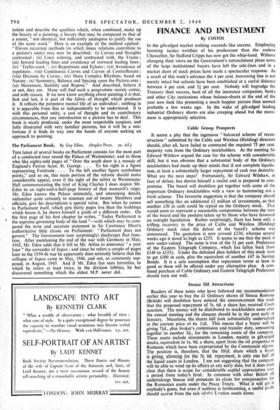The Parliament Book. By Guy Eden. (Staples Press. 7s. 6d.)
Tills latest of several books on Parliament consists for the most part of a conducted tour round the Palace of Westminster, and to those who like eighty-odd pages of " Over the south door is a mosaic of England's Patron Saint, St. George. . . . To his right is a figure representing Fortitude. . . . To the left another figure symbolises purity," and so on, this main portion of the volume should make considerable appeal, even if the sight of the tablet in Westminster Hall commemorating the trial of King Charles I does inspire Mr. Eden to an eight-and-a-half-page history of that monarch's reign. Mr. Eden knows the Palace intimately, and interesting details, unfamiliar quite certainly to nineteen out of twenty Members and officials, give his descriptions a special value. But when he comes to Parliament itself, which gets thirty pages less than the buildings which house it, he shows himself a guide of a different order. On the first page of his first chapter he writes, " Today Parliament is the supreme governing body of the land "—with which may be com- pared the terse and accurate statement in Sir Courtenay Ilbert's authoritative little classic on Parliament: " Parliament does not govern." The Government (not surprisingly) discharges that' func- tion. After mentioning the end of the war with Germany in May, 1945, Mr. Eden adds that it fell to Mr. Attlee to announce " a year later " the surrender of Japan ; and since he refers a couple of pages later to the 1939-46 war he apparently does seriously believe that the collapse of Japan came in May, 1946, and not, as commonly sup- posed, in August, 1945. And if Mr. Eden has seen turnstiles, to which he refers at least twice, in the division lobbies, he has discovered something which the oldest M.P. never did.


































 Previous page
Previous page